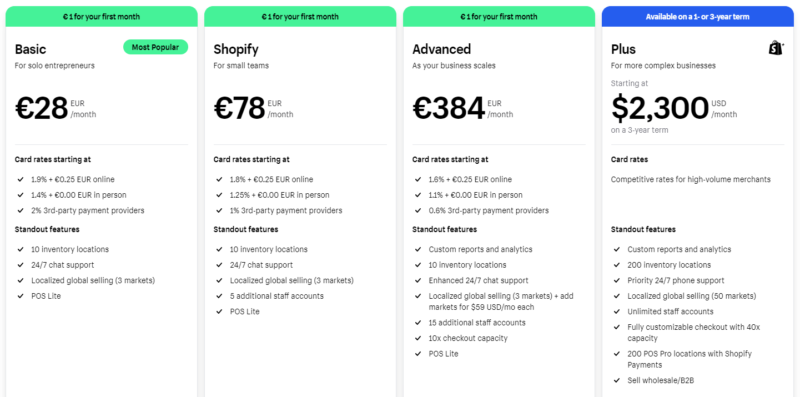Shopify Review:
Welcome to our comprehensive review of Shopify, one of the most popular e-commerce platforms globally. Known for its ease of use and scalability, Shopify provides businesses of all sizes with the tools they need to create and manage an online store. Whether you’re just starting out or looking to expand your existing online presence, Shopify offers a versatile platform that supports a wide range of selling needs. This review will delve into Shopify’s features, pros and cons, user experience, pricing, and the community and customer support offered.
Table of Contents
Shopify Features
Shopify stands out with its extensive set of features designed to accommodate both novice users and seasoned merchants. Key features include an intuitive store builder that allows users to choose from a variety of professional templates, which are also mobile-responsive. Shopify also provides powerful inventory management tools, enabling sellers to track stock levels, adjust prices, and set up automatic reordering. The platform integrates seamlessly with multiple payment gateways and offers its own, Shopify Payments, which simplifies the transaction process. Moreover, Shopify’s app store offers thousands of apps to enhance functionality, from advanced SEO tools to various marketing plugins.
Shopify Key Features
- Storefront Creation: Shopify provides a variety of customizable templates and themes to help users design their online stores. These templates are professionally designed, responsive, and customizable to suit different brands and industries.
- Product Management: Users can add an unlimited number of products, organize them into collections, and manage inventory through Shopify’s dashboard. The platform supports various types of products, including digital products and services.
- Shopping Cart Functionality: Shopify offers a secure and powerful shopping cart that supports over 100 payment gateways, automatic tax calculations, shipping rates, and abandoned cart recovery.
- Marketing and SEO Tools: The platform includes built-in SEO features to help stores rank higher in search engine results. Additionally, Shopify provides marketing tools such as email marketing integration, discount coupons, and gift cards.
- Mobile Optimization: All Shopify themes are mobile-friendly, ensuring that online stores are accessible and look great on all devices. Shopify also offers free iOS and Android apps that allow merchants to manage their stores on the go.
- Web Hosting and Security: Shopify provides reliable web hosting for online stores, ensuring fast loading times and strong security measures. This includes SSL certification for secure transactions and PCI DSS compliance.
- Analytics and Reporting: Shopify users have access to detailed analytics that track the performance of their online store, including sales, customer behavior, and traffic data. This information helps merchants make informed decisions to grow their business.
- App Store: Shopify’s App Store contains thousands of third-party apps that can extend the functionality of online stores. These apps cover a wide range of functionalities, including accounting, customer service, inventory management, and more.
- 24/7 Support: Shopify provides round-the-clock customer support via email, phone, and live chat, along with a vast repository of guides, tutorials, and forums in the Shopify Help Center.
- Point of Sale (POS) System: Shopify offers a POS app that integrates with physical retail locations, allowing businesses to manage both their online and brick-and-mortar stores from one unified platform.

Shopify Pros & Cons
Pros:
- Ease of Use: Shopify’s user-friendly interface makes it easy for anyone to build and launch an online store without prior technical knowledge.
- Scalability: The platform grows with your business, accommodating increased products, traffic, and sales with ease.
- Extensive App Ecosystem: Access to a vast array of apps and plugins allows users to add features and functionalities as needed.
Cons:
- Cost: While Shopify offers a robust platform, its monthly fees and transaction costs can add up, especially when third-party apps and premium themes are considered.
- Limited Customization: Without knowledge of Shopify’s own coding language, Liquid, customization can be restricted to the themes and options provided.
- Reliance on Apps: For many advanced features, users must rely on apps, which can sometimes impact site speed and incur additional fees.
User Experience
My personal experience with Shopify has been largely positive. Setting up an online store is straightforward, thanks to the drag-and-drop interface and pre-designed templates. The dashboard is well-organized, making it easy to manage products, orders, and customer information. Adjusting the design and adding new functionalities through the Shopify App Store is also a breeze. However, achieving a unique look or highly customized functionality can be challenging without some technical skills or hiring a developer.
Shopify Pricing
Shopify offers tiered pricing plans to suit different business sizes and needs. The Basic Shopify plan starts at $29 per month, which includes all the essentials for starting a new business. The Shopify plan is $79 per month, offering additional features like professional reports and lower credit card rates. For larger businesses, the Advanced Shopify plan at $299 per month provides advanced reporting and shipping discounts. Each plan includes web hosting, SSL certificate, and unlimited products. There’s also Shopify Plus for enterprises, which offers additional customization and support options, but pricing is quote-based.

Community and Customer Support
Shopify’s community and customer support are extensive, providing users with multiple resources for help and learning. The platform offers 24/7 customer support through phone, email, and live chat, which users generally rate highly. Additionally, Shopify’s community forums are active and helpful, with members ranging from new merchants to experienced developers. There is also a wealth of tutorials, guides, and blogs available through Shopify’s website, which can help users navigate through common issues and improve their store’s functionality and design.
Integration and Compatibility
Shopify excels in integration and compatibility, offering users a seamless experience when connecting their online store with a wide range of external applications and services. It integrates effortlessly with popular marketing tools, social media platforms, accounting software, and customer relationship management systems. Shopify’s ability to connect with major payment gateways like PayPal, Stripe, and its own Shopify Payments ensures that merchants can offer multiple payment options to their customers globally.
Shopify supports integrations with third-party shipping apps and inventory management tools, which streamline the fulfillment and restocking processes. The platform’s extensive app store contains thousands of apps, allowing store owners to add functionalities tailored to their specific business needs, from advanced analytics to customer loyalty programs. This robust integration ecosystem not only enhances store operations but also significantly expands the potential for business growth and customer reach.

Shopify Target Audience
- Entrepreneurs and Startups: Ideal for individuals launching new online businesses, Shopify provides an easy-to-use platform that allows them to quickly set up and start selling without needing extensive technical knowledge.
- Small to Medium-Sized Businesses (SMBs): Shopify supports SMBs with its scalable features that can handle increasing products, traffic, and sales as a business grows.
- Large Enterprises: With Shopify Plus, the platform meets the needs of large enterprises requiring advanced features, higher levels of customization, and dedicated support.
- Brick-and-Mortar Stores Expanding Online: Traditional retailers looking to establish or expand their online presence find Shopify particularly useful due to its integrated point-of-sale (POS) system, which bridges online and in-person sales.
- Dropshipping Businesses: Shopify is popular among dropshippers for its integration with apps like Oberlo, which simplifies the process of sourcing products and managing inventory without handling physical stock.
- Artisans and Crafters: Individuals who produce their own products, such as handmade goods, art, and crafts, benefit from Shopify’s user-friendly interface and various theme designs that can showcase their unique products beautifully.
- Niche Products Sellers: Sellers focusing on specific niche markets use Shopify to create specialized stores that cater directly to targeted customer bases, taking advantage of Shopify’s robust marketing tools.
- Digital Product Sellers: For those who deal in digital products or services, like e-books, photography, courses, or consultations, Shopify offers digital delivery apps and features that streamline the selling and distribution process.
Final Verdict
Shopify stands as a highly recommended e-commerce platform, known for its ease of use, robust features, and scalability. Whether you are starting a new online business, scaling up an existing shop, or taking a brick-and-mortar store online, Shopify offers a comprehensive set of tools to help you succeed. Its diverse array of integrations, customization options, and tiered pricing plans make it suitable for businesses of all sizes and types.
The extensive community and reliable customer support provide invaluable resources for navigating the complexities of e-commerce. For anyone looking to create a professional online store with potential for growth and expansion, Shopify presents a compelling option that combines functionality with user-friendliness. Overall, its reputation as one of the top platforms in the e-commerce space is well-deserved, making it a sound choice for entrepreneurs and businesses aiming to maximize their online presence.




